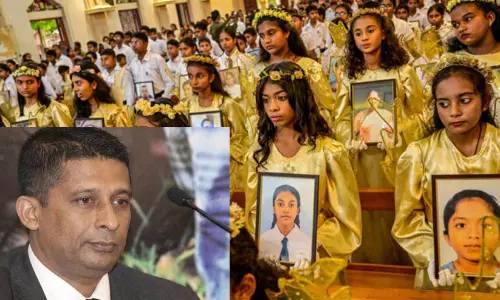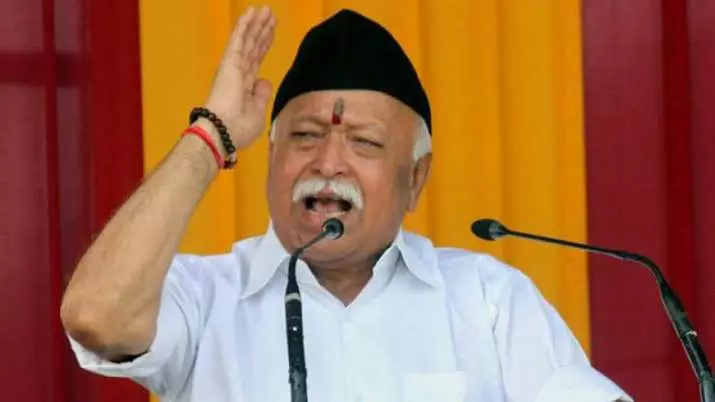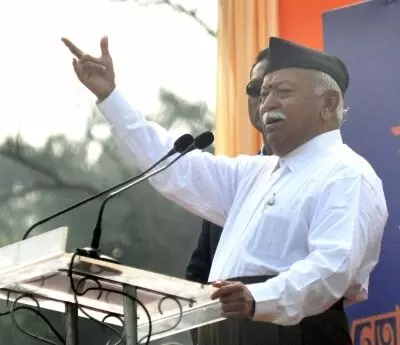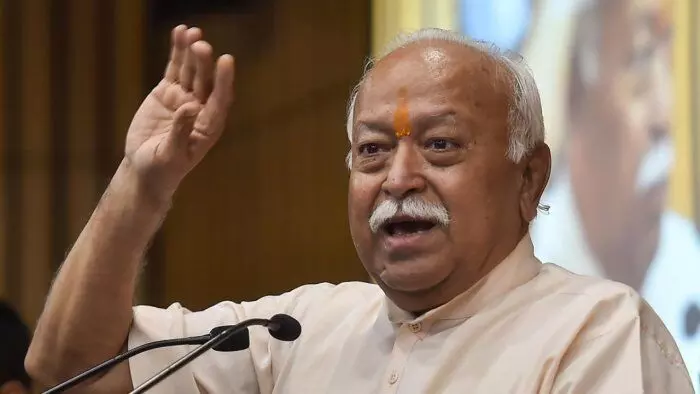
Mohan Bhagwat's 'vision of equality'
text_fieldsRSS chief Mohan Bhagwat (file photo)
A remark made by RSS Sarsanghchalak Mohan Bhagwat about the caste system in the country has triggered a new debate in national politics. Last Sunday, speaking at the birth anniversary celebrations of Bhakta Kavi Ravidas at Rabindra Natya Mandir in Mumbai, he said that caste is not anything divine and is imposed by Brahmanya. In his speech in Marathi, he said that 'Pandits' are the proponents of the caste system in India without directly saying 'high castes' or 'Brahmins'. Naturally, when such a statement was made by the supreme leader of the RSS movement, which has its roots in the upper caste-Brahminical ideology, it was natural that the national media reported it with prominence. Many of them published excerpts from the speech too. Reports quote him as saying that everything the priests say on the basis of Shastras is false, that we have been led astray by caste barriers and this very system should be abolished. Responses came from various quarters on the subject. Some saw it as an anti-Brahmin statement. Among them are not only people within the organization, but also leaders of secular parties including the Congress. There were also reactions from some Bahujan political spokesmen that Bhagwat's remarks were an acceptance of the argument on which they have for long been criticising RSS. There were those who linked the controversy in UP and Bihar over the content of 'Ramacharitmanas' a few weeks ago to Bhagwat's speech. Meanwhile, the RSS itself has come forward with an explanation on the issue. The organization's justification was that the media had misrepresented his speech. A news release from the RSS clarifies that the word 'Pandit' in Marathi means 'intellectual' or 'scholar' and attributing the sense of priests or Brahmins was malicious.
Be that as it may, Bhagwat's speech exposes many realities in the current Indian political situation. Everyone knows what the ideology of RSS and other Sangh Parivar organizations is on issues like caste and casteism and how they implement it. Apparently, their ideology is based on upper class hegemony. Keeping the caste layers that Brahmanism has created intact is in a sense also a matter of existence of these movements. The question why such a statement came from Bhagwat is leads to a cardinal conundrum. Even if the organization's correction is taken at face value, the 'anti-Brahminism' in that statement will not go away, mainly because there is another question as to what category the 'intellectuals' and 'scholars' of that time belonged to. This is not the first time Bhagwat has made such statements; he had said at a function held in Nagpur last October that the time of caste and color is over and everyone should give up such notions. He had also spoken about about the importance of the eradication of untouchability while addressing a meeting of Dalit leaders convened by the RSS in Karnataka last year. However, this anti-caste 'vision of equality' is only in word, not in deed. The position changes when it comes to backward reservation, which is the most practical scheme to eradicate centuries of caste discrimination and to bring all sections of people into the mainstream. Not only that, that class of people will also argue for upper caste reservation. The same is true when it comes to caste census. In short, there is no change in the basic policy of dismantling all the constitutional schemes to combat caste discrimination with the instruments of power, even when they go eloquent about caste eradication. Further, there are deliberate attempts to turn their evangelical zeal against other minorities in the country. It should be noted that Bhagwat, while speaking about untouchability in Karnataka, also emphasized the prohibition of religious conversion.
Bhagwat's speech only goes to reflect the depth and breadth of caste supremacy in Indian politics. This incident proves that even the weakest statement against the upper caste hegemony in the layers of rule is anathema to the public consciousness of the country. That is why the RSS itself has come forward with an explanation. On the other hand, at least some of those who stood on the anti-Sangh Parivar side reacted by treating the statements of caste equality that will hurt Brahminism as too much rhetoric. It also implies that there is not much distance in this regard between Mohan Bhagwat's state of mind and of others. A close look around us can provide us with practical proofs of this. The leftist camp including the government of Kerala, which dreams of a casteless society, and the independent thought movements in Kerala have adopted mechanisms including caste reservation as a practical way to achieve it. In short, while looking at the experiences of contemporary India, Mohan Bhagwat's 'Samatva darshan' can be considered as one of the cruel jokes of RSS and Indian politics.


























